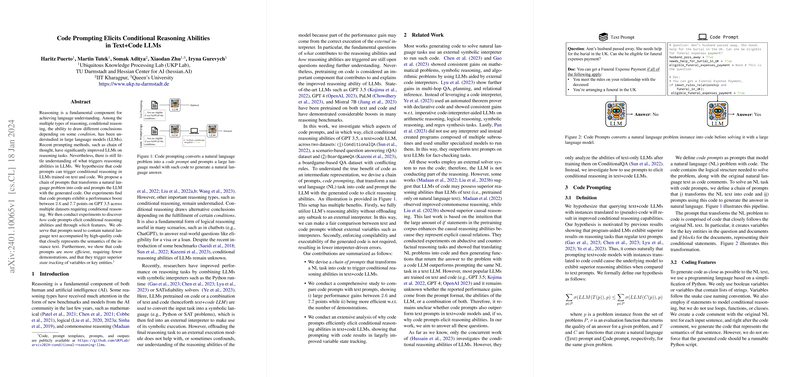Overview of Code Prompting
A paper investigates a novel approach to enhancing the conditional reasoning abilities of text+code LLMs, such as GPT 3.5. Through a process termed 'code prompting,' a natural language task is transformed into code, with the generated code used to prompt the LLM. This method leverages the LLM's capability to understand both textual and code inputs, aiming for performance improvements in tasks that require conditional reasoning.
Experimental Findings
The research outlines a clear performance improvement when using code prompts over traditional text prompts in reasoning tasks. This advancement is quantified as an increase between 2.6 and 7.7 points across different datasets—ConditionalQA and BoardgameQA. Significantly, code prompts do more than just transform text into code—they retain the natural language text within the produced code as comments, which is crucial for understanding the problem.
Investigation into Code Prompt Efficacy
The transformative methodology requires that the code not only takes on the structural form but also bears a close semantic resemblance to the original problem text. It is the alignment of the logic expressed in the code with the semantics of the text that unlocks the enhanced reasoning capabilities of the LLM. A pivotal finding is the superior efficiency of code prompts—they are found to require fewer examples (demonstrations) to guide the LLM towards correct reasoning, which makes them particularly advantageous in resource-constrained scenarios.
Implications and Future Potential
The technique showcases an increased ability of the LLM to track the state of variables or key entities throughout reasoning tasks. This implies an intrinsic advantage in facilitating logical operational tasks that deal with stateful or conditional information. Looking ahead, the researchers intend to investigate the application of this approach to other reasoning types and models, potentially broadening its utility across a more extensive range of LLM applications.
The method's main limitation lies in the necessity for an intermediate transformation step increasing the overall processing cost. However, the simplicity of the transformation holds promise for further optimization, such as outsourcing the task to a specialized but smaller model. Despite this, the research presents a compelling case for the role of code prompting in elevating the reasoning faculties of LLMs in conditional reasoning scenarios.
